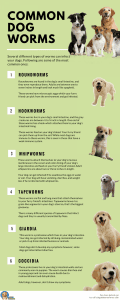Wondering about worms in dogs?
Dogs are perfect hosts for worms or any other parasite. Dogs get their mouths anywhere and will put anything and everything inside. So, they are bound to get parasites and worms.
If your dog has coughing, diarrhea, vomiting, shortness of breath, etc. you vet might prescribe deworming medicine.
In this blog post, I will share everything you need to know about dog worms and deworming in detail.
So, let’s get started!
Signs Your Dog Has Worms: Symptoms Checklist

Dog Worms: What Are the Most Common Types?
Deworming a Dog: Thing You Should Know
Here’s How You Can Prevent Dog Worms
Summing Up: Dog Worms and Deworming
Contents
Signs Your Dog Has Worms: Symptoms Checklist
If something is living inside your dog, he will show symptoms, right?
Of course!
While some worms have visible symptoms, others aren’t. In this section of the blog post, I will go through some of the most common symptoms.
Take a look.
- Frequent or intermittent vomiting or diarrhea is one of the biggest signs
- Fever
- Scooting and licking his rear
- Lethargic
- Dull-looking coat
- Stools that are coated in mucus
- Rice bodies in the dog’s stool
You can’t see some of the worms with the naked eye so, you’ll have to take a fecal sample to your vet and get it analyzed.
Dog Worms: What Are the Most Common Types?
There are a lot of different types of worms that can infect your lovely Golden Retriever. Some are extremely common, while others aren’t so much.
In this section of the blog, I will go through the most common types of worms found in dogs.
Let’s begin.
1.Roundworms
Roundworms are found in the dog’s small intestine, and they even reproduce there. Adults are between one to seven inches in length and look much like spaghetti.
These worms have microscopic eggs which your furry friend can pick from the environment and get infested.
These worms don’t cause significant health problems. However, a pregnant female can pass these worms to her puppies which is very harmful to the little ones.
If your dog has roundworms, he may get diarrhea, vomiting, have abdominal pain, be lethargic, and look pot-bellied. Your dog may even lose some weight.
2.Hookworms
These worms live in your dog’s small intestine, and the grey creatures are between ½ to ¾ inch in length. One end of these worms has a hook which attaches them to your dog’s intestinal lining.
These worms feed on your dog’s blood.
Your furry friend can pick them up from the soil. While most dogs are immune to these worms, this is seen in those that have a weak immune system.
Common symptoms include vomiting and diarrhea.
A nursing mom can pass them on to her puppies which is extremely problematic.
3.Whipworms
These worms attach themselves to your dog’s mucous membranes in the cecum and colon lining of your dog’s large intestine and feed on your furry friend’s blood. Adult whipworms are about two or three inches in length.
Your dog can get infected if he swallows the eggs in water or soil.
Your dog will have vomiting, diarrhea, and weight loss if he is infected with whipworms.
4.Tapeworms
These worms are flat and long ones that attach themselves to your furry friend’s intestines. Tapeworms leave rice grain-like segments in your dog’s stool so, that’s the biggest giveaway.
There a many different species of tapeworm that infect dogs and they’re usually transmitted by fleas.
These worms aren’t infectious, but your dog can get them by eating fleas, lice, rabbits, etc. Dogs don’t show any signs when they’re infected with tapeworm but, over time, their coat starts looking dull and they lose their appetite.
5.Giardia
This worm is a protozoan which lives in your dog’s intestine. Your dog can get infected by drinking contaminated water or pick it up from infected humans or animals.
Most dogs don’t develop any symptoms however, some dogs get intermittent diarrhea.
6.Coccidia
These protozoans live in your dog’s intestinal walls and are commonly seen in puppies. The worm causes diarrhea and in young pups and can even cause death due to malnourishment and dehydration.
Adult dogs, however, don’t show any symptoms.
Your dog can get coccidia through infected feces and soil.
Deworming a Dog: Thing You Should Know
Don’t give your dog deworming medicine before consulting a vet!
As I mentioned in the previous section, several types of worms can infect your furry friend. These worms have different symptoms and need different methods of treatment to be dealt with.
The best way to determine which worm has infected your dog is by getting his stool examined.
No matter how gross it may be, it’ll be the best for your dog’s health.
Your dog’s worming schedule will depend on several different things such as age, the type of worm, etc.
- The monthly heartworm medicine is effective in killing roundworms and hookworms as well, it also prevents your dog from getting whipworms
- Pregnant dogs won’t be wormed during the term so, the pups will be born with worms
- There are various worming medicines available for different worms. Pyrantel is commonly used with puppies
- Panacur C is used for whipworms and works between three to five days
- Praziquantel removes tapeworms which are the toughest to kill
It is always the best idea to take your dog to the vet than to give him over-the-counter medicine. Some medicines may even do more harm than good.
Here’s How You Can Prevent Dog Worms
Prevention is always better than the cure.
I strongly believe that saying.
You can prevent your dog from getting worms by simply ensuring that your furry friend has a strong immune system. This ensures that your dog won’t be as attractive a host for worms as they think---and they won’t make your furry friend sick.
If your dog has a strong immune system, he’ll simply expel these parasites without you even finding out!
You need to ensure that you give your dog the best diet by giving him natural, meat-based whole foods.
Summing Up: Dog Worms and Deworming
It is crucial to deworm your furry friend if you want him to be happy and healthy.
Dogs are the ideal hosts for worms, and they can get them quite easily because they like to lick and eat anything and everything.
So, getting worms is inevitable.
Several types of worms infect dogs, and the treatment option depends on which worm infects your furry friend. You’ll have to get your dog’s stool examined to determine the best treatment method.
Do you have questions? Let us know in the comments, and I’ll get back to you as soon as possible.





Leave a Reply
You must be logged in to post a comment.